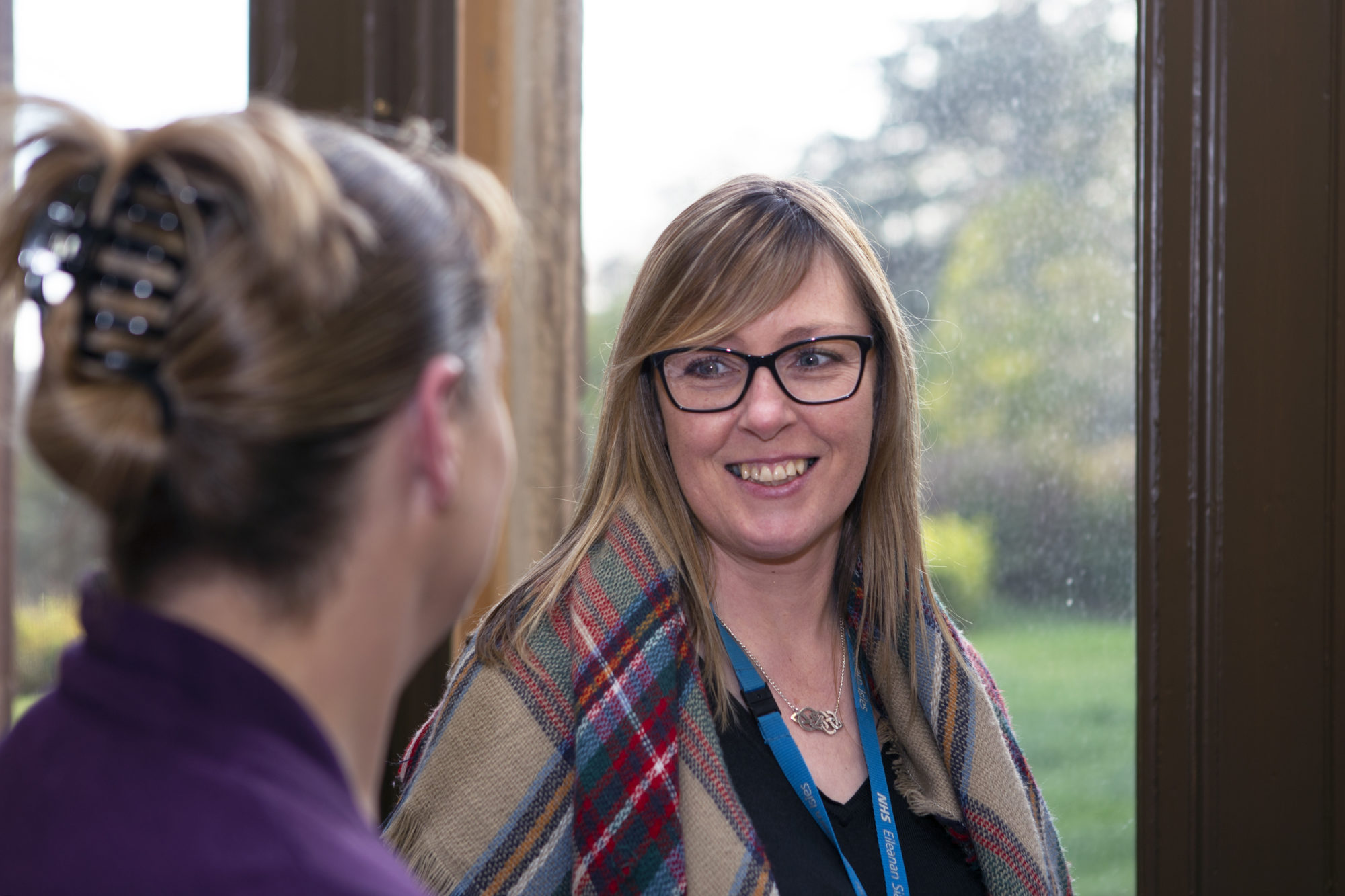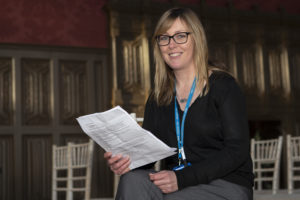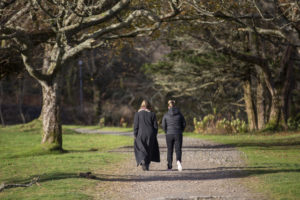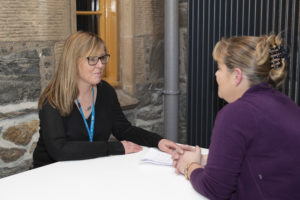Coleen Mcleod
 Coleen Mcleod works as a Substance Misuse/Mental Health Liaison Nurse for NHS Western Isles and is persistent in her approach to providing and enhancing recovery care across Lewis and Harris.
Coleen Mcleod works as a Substance Misuse/Mental Health Liaison Nurse for NHS Western Isles and is persistent in her approach to providing and enhancing recovery care across Lewis and Harris.
 I didn’t start off wanting to be a nurse. My family are all nurses and I thought I wanted to do something different, so I went down the route of social care support work for people with a variety of needs. I spent some time in Romania working with homeless children who had addiction problems to help them get through daily life. It was that experience that stuck with me the most – and when I looked at the issues we have in Scotland, I wanted to do more. I felt that if I had a nursing qualification then I could put the skills I had learned through life into helping a group that I felt were more disadvantaged and fighting to have a voice to achieve the basic things that people need to survive.
I didn’t start off wanting to be a nurse. My family are all nurses and I thought I wanted to do something different, so I went down the route of social care support work for people with a variety of needs. I spent some time in Romania working with homeless children who had addiction problems to help them get through daily life. It was that experience that stuck with me the most – and when I looked at the issues we have in Scotland, I wanted to do more. I felt that if I had a nursing qualification then I could put the skills I had learned through life into helping a group that I felt were more disadvantaged and fighting to have a voice to achieve the basic things that people need to survive.
So, I was a bit older when I qualified from mental health nursing. My first job was in Fraserburgh working as a community mental health nurse in addictions. I got into my dream job straight away. However, I always said I wanted to move to an island and three years ago I moved to Stornoway. Island life is so diverse now, there are people who come here from all over the world. So, although I am an ‘incomer’, I am one of so many newcomers who have settled here.
 I can start the day by meeting a client on the way to work who might find it difficult to get to the clinic. This job must be flexible because of the geography of the island, and I find myself out and about quite a lot. I’ve met with people in a coffee shop, at workshops, even on the beach sitting with our feet in the sand – it’s very varied, it depends on the person and where we are trying to go with their treatment plan. It’s about keeping that individual at the centre, making them comfortable and giving them a level of control in the decisions they make.
I can start the day by meeting a client on the way to work who might find it difficult to get to the clinic. This job must be flexible because of the geography of the island, and I find myself out and about quite a lot. I’ve met with people in a coffee shop, at workshops, even on the beach sitting with our feet in the sand – it’s very varied, it depends on the person and where we are trying to go with their treatment plan. It’s about keeping that individual at the centre, making them comfortable and giving them a level of control in the decisions they make.
I am also the lead nurse for Naloxone – the opioid overdose reversal drug – and the needle exchange lead, supporting pharmacy staff who undertook specialised training in preparation for providing this service when it was set up for the first time in the Western Isles in 2017.
I call working in addictions my dream job and I think that’s because I think when you are supporting people on to the recovery pathway, you’re actually walking alongside them – you’re getting to know them from their very early life story. To be able to put a plan of care in place it has to be one specific to that individual, so you need to know exactly what their issues are, and where their behaviour comes from. You’re not just going in and doing a little piece of work – you are looking at the whole person. You are looking at multi-agency working, addressing an individual’s needs and working with how that person may choose to prioritise their own needs – sometimes addressing their addiction comes at the very end. Recovery must happen at the client’s pace, not that of the service.
 At the heart of expert mental health nursing is building relationships, working with each individual to build up their confidence and self-esteem to believe that something else can work as well as the substances. It is a very interesting job, and it does pull on all your training and all your skills to be able to support that individual in the way that they need.
At the heart of expert mental health nursing is building relationships, working with each individual to build up their confidence and self-esteem to believe that something else can work as well as the substances. It is a very interesting job, and it does pull on all your training and all your skills to be able to support that individual in the way that they need.
Referrals to the service are made for addictions to illicit substances or for misuse of prescription medication. You have to be honest with the individual and gain their trust. So, getting them to open up, to accept it is okay to have feelings, and working on a coping strategy to deal with the pressures that come with life. It requires a very high level of skill and experience.
I do love my job – seeing people come through recovery and supporting them and having that faith they can make it until they start believing you. When they start believing you it is amazing. Seeing individuals who had shut themselves away engaging in community support, re-establishing relationships with family, to be able to see them look at challenges in their lives with options with how they can deal with it, is so rewarding.
I already had a few pilot schemes going when I started the Queen’s Nurse programme and I am focusing on one of these for my issue for development: the establishment of a recovery programme.
Since I started working within the addictions field, I identified common issues experienced by clients who have actively engaged in addressing their substance issues but have encountered difficulties when moving on. A sense of limbo occurred where they were no longer accepted within the culture by peers they had previously been involved with but did not have the confidence and determination to fight for a different life within a new culture that appears not to accept them.
 In my previous post, I approached my manager with an idea to bring community support and employment services together to develop a moving on programme. I convinced other agencies to become involved in a pilot project in delivering what services already provided but within a programme which would be offered to individuals in recovery. I brought forward a successful programme which saw over 90% of the attendees moving onto further education, voluntary work or employment.
In my previous post, I approached my manager with an idea to bring community support and employment services together to develop a moving on programme. I convinced other agencies to become involved in a pilot project in delivering what services already provided but within a programme which would be offered to individuals in recovery. I brought forward a successful programme which saw over 90% of the attendees moving onto further education, voluntary work or employment.
During my time within NHS Western Isles, I have worked with many clients who struggle to move on following a period of abstinence. As a small island, we have the added pressure of lower employment opportunities and clients being unable at times to have a fresh start.
My vision is to bring forward a similar programme, where third sector agencies, health professionals and employment agencies commit to contributing to a twelve week ‘moving on’ programme. It would allow individuals the opportunity to gain essential skills, confidence and build positive self-esteem to make informed choices. The Queen’s Nurse programme has given me the confidence to know that I can bring others with me to make my vision a reality.